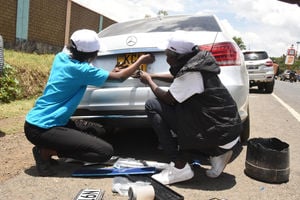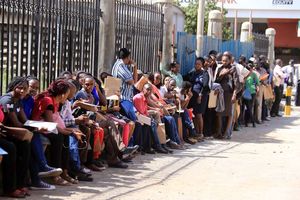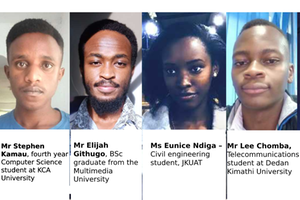
Happy graduands during a university ceremony. Thousands of graduates cannot get jobs because of a mismatch between the skills and knowledge they acquired and the market demands.
Thousands of university graduates are unable to secure employment because of misalignment between the courses they studied and the market demands, a Nation study suggests.
Some graduates also find themselves jobless because of conflicts between professional bodies that accredit degree programmes and the Commission for University Education (CUE), despite a court decision offering direction on the matters.
This has forced the graduates to embrace careers they never studied for, just to earn a living.
A bill drafted by the Ministry of Education, therefore, seeks to amend overlaps in accreditation of degree programmes. The programmes whose graduates find jobs hard to come by include engineering, law and medical courses.
The Teachers Service Commission also turns down employment applications from graduates whose fields are not covered in the school curriculum.
Four years have drifted by since Ogeto Peter John proudly donned a mortarboard and gown, graduating with a bachelor's degree in criminology from Moi University.
However, despite pouring his heart and soul into his endeavours, the elusive embrace of employment has remained out of reach.
His degree, crafted for roles within governmental investigative bodies like the Directorate of Criminal Investigations (DCI) or the police service, unwittingly became a barrier, locking him out of opportunities in the private sector that could have offered a different path to fulfilment and stability.
In a world where connections often dictate success, Mr Ogeto found himself stranded, despite his numerous applications and CV adjustments. Resorting to manual jobs, he spent a year behind the wheel as a school driver and currently finds solace in volunteering. But deep down, a sense of disillusionment gnaws at his soul.
“I studied criminology and it’s been challenging because I’m unable to pursue opportunities in the private sector. In these government positions, having connections, or a ‘godfather’, is often crucial to securing employment, and despite my numerous applications and CV adjustments, I've had no luck,” he says.
Reflecting on his past decisions, Mr Ogeto realises the gravity of his choices. He yearns for a different path – one that offers flexibility and prospects beyond the confines of government employment. Perhaps a skill-based course, one that allows for private sector opportunities or even entrepreneurship, would have been a wiser choice.
“I should I would have opted for a different path – one that offers more versatility in the job market, perhaps a skill-based occupation that allows for private sector employment or entrepreneurship. There’s a need for universities to align their courses with job market demands. The criminology course I studied doesn't seem to meet the needs of today's employers, and this mismatch is evident as more graduates flood the market each year. There's a necessity for educational institutions to adapt, provide courses that are relevant, and equip students with the skills needed for diverse career paths,” Mr Ogeto says.
Law change
The Universities (Amendment) Bill, 2024, seeks to address the matter and mandate CUE with the sole responsibility of accrediting degree courses.
If effected, this will effectively take away the power of accreditation of degree programmes from professional bodies, which license and regulate professions. The Bill seeks to amend sections of the Engineers Act, 2011; the Medical Laboratory Technicians and Technologists Act; the Legal Education Act, No. 27 of 2012; and the Advocates Act.
Also targeted for amendment are the Veterinary Surgeons and Veterinary Paraprofessionals Act, 2011; the Nutritionists and Dieticians Act, 2007; the Medical Practitioners and Dentists Act; and the Media Act. The draft proposes to categorise universities as research universities, science and technology universities, comprehensive universities, technical universities, specialised and graduate universities.
“A category of a university described under Subsection 1 shall not be converted to or offer a programme offered by a university in a different category without accreditation under this Part,” it reads.
The proposed amendments follow recommendations contained in the report of the Presidential Working Party on Education Reforms “to remove overlap in accreditation of academic programmes in universities and to comply with the court judgment prohibiting professional bodies from charging levies and engaging in accreditation of programmes in universities.”
This is in reference to a 2020 High Court order that accreditation of university programmes is the sole responsibility of CUE in a case between the Kenya Medical Laboratory Technicians and Technologists Board and the Attorney General. Other similar petitions had also been filed against the AG by the Council of Legal Education and the Engineers Board of Kenya. They were merged into one and a judgment delivered.
In 2016, James Njoroge stood proudly among his peers, a diploma in hand, as he graduated from Mount Kenya University. Little did he know that his journey from a student to a professional would be fraught with disappointment and despair.
“I graduated with a diploma in ICT in 2016, but since then, I have survived on internship. I’m not getting any jobs,” he told the Saturday Nation.
Since tossing his graduation cap into the air, Mr Njoroge's days have been filled with a relentless pursuit of employment. The once bright future he envisioned has dimmed, overshadowed by the stark reality of unemployment.
Also Read: The frustrations of Kenya’s jobless doctors
“It is really frustrating going to school and nothing is coming up. I decided to add my experiences by doing short courses, but still, nothing has come up. The government and institutions should align the courses with the job market needs and create more jobs,” he says.
For Edith Lukholele, graduating with a degree in supply chain management from Moi University in 2018 was supposed to be the start of a promising career journey. However, it's been an uphill battle to secure gainful employment.
“Despite my qualifications and experience, job opportunities in my field seem elusive, leaving me with no choice but to settle for internship. Now, with a child to provide for, I find myself trapped in a job at a call centre – a far cry from what I envisioned for myself. If I could turn back time, I would never have chosen this course. The frustration and sense of failure weighs heavily on me, knowing that the path I took has led me to a dead end.”
She called on the authorities to re-evaluate the relevance of certain courses, or lack thereof in the job market. “Education should be a pathway to a better life, a means to secure employment and sustain oneself. Spending a fortune on tuition, only to end up with nothing to show for it, is not just disheartening, it’s soul-crushing. It’s time for change, for a system that truly prepares students for the realities of the workforce and empowers them to build fulfilling careers,” Ms Lukholele says.
Since graduating with a bachelor's degree in environmental science from the University of Nairobi, Eugene Wasike's journey has been a rollercoaster of emotions, marked by frustration, reflection, and ultimately, resilience.
Mr Wasike’s academic journey began with high hopes and aspirations, driven by his passion for environmental conservation. However, as he delved deeper into the field, he encountered numerous challenges that left him questioning his choice of career.
“I should have diversified my skillset into other fields. The specialisation I pursued didn't offer much opportunity, especially considering the prevalent corruption within the industry and opportunities were scarce, I felt disillusioned and uncertain about my future,” he says.
Despite his setbacks, he refused to succumb to despair. Instead, he embarked on a journey of self-discovery and exploration.
“I realised that I needed to diversify my skillset and explore other avenues. I needed to adapt to the changing landscape of the job market and find opportunities where my talents could thrive. Currently, I am doing entrepreneurship and planning to go back and acquire some skills.”











